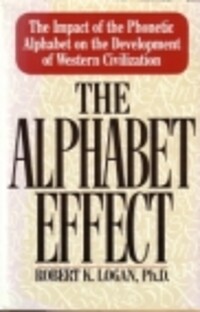Status
Available
Call number
Collection
Publication
St Martins Pr (1987), Paperback, 272 pages
Description
This work is a study of this evolution of writing systems. It describes the role the phonetic alphabet has played in the development of Western civilization. Drawing a variety of conclusions about how societies advance, the author shows how the advent of mass communication and the use of computers affect how we communicate.
User reviews
LibraryThing member ebethe
Best than average, and with an interesting thesis.
LibraryThing member brewbooks
This is a curious book, it made me thinking, and also left me wanting to learn more.
The premise of the book is that the use of the phonetic alphabet led to a paradigm shift in human culture among Western Europeans, that left behind the rest of the world. "The use of repeatable, fragmented,
I want to learn more about the development of science in China. There are a number of reference to Joseph Needham's epic work Science and Civilisation in China, which currently comprises 27 volumes. Logan primarily refers to Volume 2: History of scientific thought - which I should like to read and understand. Logan uses Needham's work to support his premise that phonetic alphabets led to abstract science and that pictographic languages do not enable the development of abstract science. Logan left me wanting to learn much more, I certainly was not convinced that his hypothesis is supported based on his research.
I don't believe that the phonetic alphabet led to the development of monotheism. Logan points out that the Greeks were the first to perfect the phonetic alphabet by adding vowels. Yet, the Greeks were polytheistic, as were the Romans.
This book does assemble a lot of interesting facts and data, which are flying together in loose formation. I think that the development of codified law, monotheism, abstract science, and deductive logic can not be explained as simple offshoots of the development of the phonetic alphabet. I believe the development of each of these areas in much more complex. In particular, mathematics must lie at the origin of abstract and deductive logic. I resonate with a quote that Logan uses:
Philosophy is written in this vast book, which lies continuously open before our eyes (I mean the universe). But it cannot be understood unless you have first learned to understand the language and recognize the characters in which it is written. It is written in the language of mathematics, and the characters are triangles, circles,and other geometrical figures. Without such means, it is impossible for us humans to understand a word of it, and to be without them is to wander around in vain through a dark labyrinth.
(Galileo Galilei, Il saggiatore, 1623.)
The premise of the book is that the use of the phonetic alphabet led to a paradigm shift in human culture among Western Europeans, that left behind the rest of the world. "The use of repeatable, fragmented,
Show More
identical elements, the letters, which began with the introduction of the phonetic alphabet is an an example of such a paradigm. The extension of this idea resulted in the development of codified law, monotheism, abstract science, and deductive logic." I want to learn more about the development of science in China. There are a number of reference to Joseph Needham's epic work Science and Civilisation in China, which currently comprises 27 volumes. Logan primarily refers to Volume 2: History of scientific thought - which I should like to read and understand. Logan uses Needham's work to support his premise that phonetic alphabets led to abstract science and that pictographic languages do not enable the development of abstract science. Logan left me wanting to learn much more, I certainly was not convinced that his hypothesis is supported based on his research.
I don't believe that the phonetic alphabet led to the development of monotheism. Logan points out that the Greeks were the first to perfect the phonetic alphabet by adding vowels. Yet, the Greeks were polytheistic, as were the Romans.
This book does assemble a lot of interesting facts and data, which are flying together in loose formation. I think that the development of codified law, monotheism, abstract science, and deductive logic can not be explained as simple offshoots of the development of the phonetic alphabet. I believe the development of each of these areas in much more complex. In particular, mathematics must lie at the origin of abstract and deductive logic. I resonate with a quote that Logan uses:
Philosophy is written in this vast book, which lies continuously open before our eyes (I mean the universe). But it cannot be understood unless you have first learned to understand the language and recognize the characters in which it is written. It is written in the language of mathematics, and the characters are triangles, circles,and other geometrical figures. Without such means, it is impossible for us humans to understand a word of it, and to be without them is to wander around in vain through a dark labyrinth.
(Galileo Galilei, Il saggiatore, 1623.)
Show Less
Language
Physical description
272 p.; 8.1 inches
ISBN
0312009933 / 9780312009939
